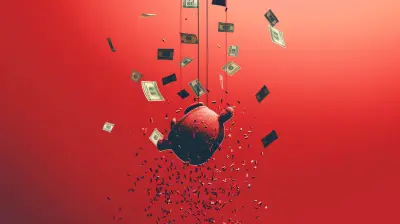The Power of Compound Interest in Achieving Financial Independence
21 July 2025
Let’s be real—who wouldn’t love to kick back one day, ditch the 9-to-5 grind, and live life on their own terms? Whether that's traveling the world, spending more time with family, or starting that passion project you’ve always dreamed of—financial independence makes it possible.
But here’s the million-dollar question: how do you actually get there?
Enter compound interest. It’s like the silent MVP of wealth-building strategies. You don’t hear people bragging about it on social media, but behind every financially free person is the power of compound interest doing its quiet magic.
In this article, we’ll walk you through what compound interest is, how it works, and why it should be your best friend on the road to financial freedom.

What Is Compound Interest?
Okay, imagine you’ve got a snowball. You roll it down a hill. As it goes, it picks up more snow and gets bigger…and bigger. That’s compound interest in a nutshell.Compound interest is the process where your money earns interest, and then that interest earns more interest. Unlike simple interest, which only earns money on the amount you originally saved or invested, compound interest builds upon itself over time.
It’s the difference between growing wealth slowly and watching it snowball into something massive.
The Formula Behind the Magic
Don’t worry, we’re not turning this into a math lesson—but here’s a quick look under the hood:Compound Interest Formula:
`A = P(1 + r/n)^(nt)`
Where:
- A = Final amount
- P = Principal (your initial investment)
- r = Annual interest rate (decimal)
- n = Number of times interest is compounded per year
- t = Time in years
But really, the biggest takeaway is this: Time + Money + Consistency = Financial Independence.

Why Compound Interest Is So Powerful
Let’s bring this to life with a real-world example.Say you invest $5,000 at an annual return of 8%, and you never touch it again. After 30 years, you’d have over $50,000. That’s not magic, it’s math—and it’s all thanks to compounding.
Now, imagine you add $5,000 every year for 30 years. You’re looking at nearly $620,000. That’s right. From just consistent annual contributions and letting your money grow.
Still not convinced? Here’s why compound interest is your best shot at financial independence:
1. Time Works For You
This isn’t about how much you earn; it’s about how long you stay in the game. The earlier you start investing or saving, the longer your money has to grow.Even small contributions in your 20s can outpace large contributions started in your 40s.
Think of it like planting a tree. The sooner you plant it, the longer it has to grow deeper roots and bear fruit.
2. It Rewards Patience
Compound interest doesn’t require genius, luck, or enormous income. What it does demand is patience.The first few years may not seem impressive, but stick with it. Once you hit that tipping point—usually after a couple of decades—growth explodes.
It’s like boiling water. For the first few minutes, nothing happens. Then suddenly—it bubbles over.
3. It Turns Saving into Investing
You might’ve heard this before: “Don’t just save, invest.” And compound interest is why.Keeping your money in a savings account with a 0.5% interest rate? It’ll grow, sure, but you're crawling.
Invest it wisely—stocks, index funds, retirement accounts with historical average returns of 7–10%—and your money’s flying on a private jet.
It’s not just about stashing money away; it’s about making your money work for you.

Compound Interest and the Road to Financial Independence
So how exactly does this all tie into financial independence?What Is Financial Independence Anyway?
Financial independence means you’ve saved and invested enough money to cover your living expenses—for life. You no longer have to work for money. Your investments do that for you.It’s not about being rich. It’s about freedom.
And guess what’s behind the curtain making that freedom possible? You got it: compound interest.
The FIRE Movement
Maybe you’ve heard of the FIRE movement—Financial Independence, Retire Early. It's built almost entirely around saving significantly and investing aggressively to take full advantage of compound interest.People in the FIRE community often save 50% or more of their income and invest it in low-cost index funds. Why? Because they know time and compound interest are the secret sauce to early retirement.
The Snowball Effect in Action
Let’s say you need $1 million to retire comfortably. That number might seem massive. Intimidating even.But if you’re consistently investing $500 a month with a 9% return, you could hit that $1 million mark in about 35 years.
Double that to $1,000 a month? You’re there in 27 years. And if you start young? You shave even more years off the timeline.
You’re letting your money snowball down that hill for as long as possible.

Key Tips to Maximize Compound Interest
Now that you’re seeing the light, let’s talk strategy. How do you actually make compound interest work for you?1. Start ASAP
Like, yesterday.Even if it’s just $100 a month. Even if it’s tight. The earlier you start, the more you’ll benefit.
2. Automate Your Investing
Out of sight, out of mind.Set up automatic transfers into your investment accounts so you’re consistently contributing without thinking about it.
It’s like putting your wealth-building on autopilot.
3. Take Advantage of Tax-Advantaged Accounts
Think IRAs or 401(k)s. These accounts let your money grow tax-deferred or tax-free, which supercharges compounding.No taxes nibbling away at your gains every year? That’s a serious bonus.
4. Reinvest Your Returns
This one’s non-negotiable.Whether it’s dividends, earnings, or interest—always, always, reinvest.
It’s how you harness the power of compounding. Pulling the money out just breaks the cycle and slows your progress.
5. Be Consistent
Invest during good times, invest during bad times. Markets go up and down, but compound interest works best when you stay in the game.Consistency beats timing every time.
Common Myths That Might Be Holding You Back
Let’s bust a few myths that stop people from taking compound interest seriously:"I Don’t Have Enough Money To Start"
False. You can start with $10, $50, or $100 a month. Small amounts grow into big numbers over time.Remember: something is always better than nothing.
"It’s Too Late For Me"
Also false. While starting young is ideal, starting in your 30s, 40s, or even 50s still gives you time to build serious wealth—especially if you maximize your contributions and returns."The Market Is Too Risky"
Sure, the stock market isn’t a straight line up. But over the long haul, it has historically delivered solid returns.And compound interest thrives over the long haul.
Real-World Example: Meet Lisa and Mark
Let’s paint a picture.Lisa starts investing $300 a month at age 25, earning an average return of 8%. She does this for 20 years and stops at age 45 but leaves the money untouched.
Mark doesn’t start until age 40. He invests $500 a month until he’s 65.
At 65, who has more money?
Surprisingly, Lisa does. Her early start gave compound interest an extra 15 years to work—even though Mark invested more money overall.
Moral of the story? Start early and give your money time to grow.
Final Thoughts: Let Compound Interest Be Your Best Friend
Here’s the deal—you can work for your money or make your money work for you. If financial freedom is the goal, harnessing the power of compound interest isn't optional—it's essential.It’s not flashy. It won’t make you rich overnight. But over time? It quietly builds the kind of wealth that changes your life.
So take the first step. Start small if you have to. Be consistent. Stay the course.
Because when it comes to achieving financial independence, compound interest isn’t just powerful—it’s unstoppable.
all images in this post were generated using AI tools
Category:
Financial FreedomAuthor:

Harlan Wallace
Discussion
rate this article
1 comments
Runevale Kim
This article succinctly captures the transformative impact of compound interest on financial independence. By illustrating how small, consistent contributions can grow over time, it serves as a vital reminder for readers to start investing early. Thank you for sharing these valuable insights on such an important topic!
August 12, 2025 at 12:08 PM

Harlan Wallace
Thank you for your thoughtful comment! I'm glad you found the insights helpful in highlighting the importance of starting early with investments.


